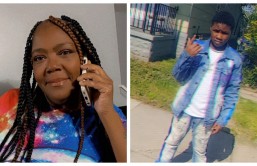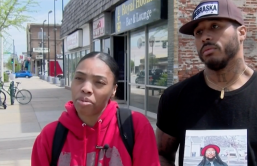Multiplatinum hard rock band Ugly Kid Joe had a string of major hit singles in the early ’90s — “Everything About You,” “Neighbor,” “Cat’s in the Cradle” and “Busy Bee” — and then virtually disappeared. There wasn’t a big fuss when the group disbanded in 1997, and a 2010 reunion went pretty unnoticed in the United States. However, Ugly Kid Joe is now proving that rock fans really have missed their brand of music by snatching up enough copies of new album “Uglier Than They Used Ta Be” to make it debut at No. 21 on Billboard’s Hard Rock Albums chart.
The 11-song album, which dropped Oct. 16 via Metalville/UKJ Records, is the California-based band’s first full-length release in 19 years. Seven current and former members of Ugly Kid Joe, calling themselves the “Seven Headed Monster,” took part in the 21-day recording session at Louisiana’s JT Studios and Balance Studios: Whitfield Crane (vocals), Klaus Eichstadt (guitars), Sonny Mayo (guitars), Shannon Larkin (drums), Zac Morris (drums), Cordell Crockett (bass) and Dave Fortman (guitars). Fortman — who has gone on to produce major records for the likes of Godsmack, Slipknot and Evanescence — helmed the effort.
“Uglier Than They Used Ta Be” features nine great original rock tunes penned by the band and two cool covers. The band’s take on the Rare Earth version of “Papa Was A Rolling Stone” has guest vocals from Australian chart-topper Dallas Frasca, and a revamp of the classic metal song “Ace of Spades” contains the fretwork of Motörhead guitarist Phil Campbell (who also lent his talents to “My Old Man” and “Under the Bottom”).
Band founder and driving force Crane is very excited for this new chapter in the book of Ugly Kid Joe. “We were passionate about this project,” he said during an exclusive interview with Headlines & Global News. “We wanted to be there. It came out killer, and we’re excited!”
Read on to find out what else the loquacious Crane had to say about the new album, his 25-year-old band and his love for all things Motörhead.
Tell everyone about new album “Uglier Than They Used Ta Be.”
We brought in everybody that’s been involved with the band for the last five or six years, and we just shut everybody in a room and made some music. We locked ourselves in there for 21 days in a row. We worked 13 hour days. It was quite intense.
It’s really cool that the whole band was together in the studio. Many groups can’t afford to do that these days and rely on modern technology and file sharing to put an album together.
There’s many ways to the mountain. There’s many ways to use the technology — and there’s many ways not to use it. I’ve flown in vocal tracks that were sent to me from Europe and it sounds f--king great. But as far as the synergy of this particular project and the full circle of it all, I believe you’re correct in celebrating the fact that we were all in the same room. There was a lot of love. A lot of talent. A lot of laughing. A lot of old stories. A really very familiar frequency that you have when you’ve worked with somebody that intensely over the years. So we were all there, and we were and are still in love with music.
Were the songs written before you convened in Louisiana or did you wait until you all got together to start the process?
Both. Songs manifested right there out of the blue. Some songs were structurally completely done, but maybe some lyrics weren’t completely done or a bridge was needed here and there. We’re kind of just open. We went in there with maybe 15, 16 songs. Some of the songs you think are just the s--t, then you listen back and it doesn’t turn out like you wanted it to. In 21 days, you have to be quick to discard things that aren’t really magical. We had a s--tload of songs that we dwindled down. [The album is] crazy great! I like the whole record.
Did recording in Louisiana influence any of the record’s sound?
There are southern influences all over this record. Dave Fortman is the south, and he is such a man of the moment, a fantastic producer and player. The end guitars on “Hell Ain’t Hard to Find,” that’s straight up Skynyrd — it’s incredible. We all love Lynyrd Skynyrd and Ronnie Van Zant and all those guitar players.
Did you get to hang out any while down south?
I wish. We were in Covington, so there’s not a lot going on. I suppose if we were in New Orleans, we would have never even finished the record. We really just worked. It really was 21 days in a row, 13-hour days. By the last week, it was really just me, Klaus and Dave because everyone had done their parts and flown away. You start losing your mind — you’re like a mad scientist at that point — you’re so close to the fire.
Why did you choose to cover Motörhead’s “Ace of Spades”?
I’ll tell you the story, which is pretty neat. I really appreciate it. I love playing cool cover songs, and I had all these ideas for covers and all the guys were like, “No. We’re only going to do originals. No is the answer.” I kept trying to push ’em to the middle. “C’mon! We can do ‘Rock Candy’ by Montrose!” We didn’t have the time to f--k around with my crazy ideas. So it was the third and last day of tracking the drums in one of the studios we worked at, and I kept on pushing for “Ace of Spades.” Zac Morris, one of the drummers, looked at me and goes, “I can play that for you, boss.” I go, “What do you mean? You can just go play it?” And he’s like, “Yeah, straight up.” By that time, he had really proven himself. We had never played with him in the studio. We [had only] played live with him. We didn’t know what his currency would be in the studio. He’s phenomenal! What a supertalented human being. Zac went in and sat behind the drum kit, the guy pushed record and he played “Ace of Spades” without a band. He just goes, “I got it.” I go, “Really? You can do that for real? You can walk in and play the song?” I was just like, “Holy s--t!” So stuff like that was going on. Let me tell you, sometimes when you get out of bed, some days you feel like you hit a whole bunch of red lights, and some days everything’s cool and fluid and all the lights are green and no parking tickets and all that. Sometimes when you’re in the creative process, making a new Ugly Kid Joe record or whatever you’re doing, sometimes stuff is fluid and you can kind of feel it innately. Sometimes you’re still going to go through the process, but something’s rubbing. In this case, the making of the music was really fluid and, I wouldn’t say effortless, because we put a s--t ton of effort into it, but we know we made something special.
How did you secure Phil Campbell to play on “Ace of Spades” and two other songs?
I live for Motörhead. Those guys are my family. The first big tour we ever had in 1992 — when everything went crazy and, like wow, the world changed real fast — we went on the Ozzy Osbourne No More Tours tour. The bill was Ugly Kid Joe, Motörhead and Ozzy. I’ll tell you a funny story that happened the other day. Motörhead was playing the Warfield, right down the street [from where I live], in San Francisco. So I started to have some interaction [with the band]. Then I get a text from one of the guys that looks after the guys and the text just says: “By the way, you’re singing ‘Overkill’ tonight. Second verse and choruses.” I’m like, “Oh, s--t.” I’ve sung with Motörhead a couple of times, usually “Killed by Death.” So I went early to the show and sat with Lemmy [Kilmister] in the dressing room backstage. I had my lyrics with me. He’s got a heart of gold. Then he says the nicest thing. “Overkill” is the last song of the set, the encore, and he goes, “I expect you to be up there for the bow at the end.” I go, “Really? Really?” He’s so great and goes, “Of course! You performed, didn’t you?” He’s so exacting and obvious with righteous statements. So there we were, we sang “Overkill,” and we were at the very end. He was getting a handful of bass picks to throw out to the crowd right before the bow, and I kind of cruised up to him and said, “Hey man, do you really want me to come do the bow?” He gave me the nod and a handful of bass picks, and we all walked out. [Drummer] Mikkey Dee was throwing drumsticks, Phil Campbell is throwing guitar picks and me and Lemmy are throwing bass picks. There I was with Motörhead bowing to a San Francisco crowd. What an honor! When you asked me how Phil ended up on the record, it’s because I have a really beautiful relationship with all those guys.
And why the “Papa Was A Rolling Stone” cover?
Well, that story’s pretty fun. We did a tour with Skid Row in New Zealand and Australia. If I’m going to end up anywhere vaguely cool, at the end of the tour, I’m going to stay there for a couple of weeks. I’ll experience the culture. I want to see what it’s all about rather than just travel through the place — sure you’ll have a stamp on your passport, but you never really took advantage of your station. I stayed in Australia at the end of that tour in Melbourne. I rented a cool two-bedroom apartment in a hotel and convinced Sonny Mayo to stay with me. We rode bikes and met cool people. We went to see the band Dallas Frasca [because] we were told we must go see this girl sing. The guitar player, Jeff Curran, is one of my favorite people ever. They’re a great, magical, legendary Australian band. So we go to this show to see this band and we all end up singing an AC/DC song live. This was the first time I ever met them. Afterwards, we were talking and connecting. I immediately looked at everybody and said, “Hey! We should all record. Tomorrow.” Everyone’s like, “What do you mean?” I said, “I have no idea, but let’s just go. You figure out the studio and let’s do it.” Within 12 hours, we had a studio to go to. It might have been Sonny’s idea for “Papa Was a Rolling Stone.” We had the Rare Earth version, listened to it, and tracked all day. We captured that moment in Australia. Then we took those tracks from long ago and had Dave Fortman mix it. So we had that in our back pocket for a while. As we’re making this record, I’m thinking, “What’s a good representation of some of the energies and experiences that this band has had?” I thought that it would be great to put it on the new release because it shows great dimension to who we are and what we’re about. We’re a collective most of the time. That’s the story.
Many of your earlier songs had comical and humorous lyrics. There doesn’t seem to be any on the new album.
There’s some dark humor there. “Hell Ain’t Hard to Find,” those lyrics are dark humor.
Is this a more mature Ugly Kid Joe?
For sure. How could you not be? It’s been over 20 years since 1991 [when UKJ’s debut “As Ugly As They Wanna Be” came out]. Imagine all the different bands we’ve been in and the different experiences we’ve collectively had. This is what we sound like now. This is who we are. We’re certainly not chasing anything. We’re not running away from anything. And, most importantly, we wanted to make the music. There’s something cool about that. In 1997, when we broke up, we were done with each other. We’d had it. We didn’t hate each other, but…. Everyone’s gone off and experienced whatever, and now we’ve come back and made this body of music which reflects everybody’s collective experience and evolution. If you are just being present and making music that you like from your core, that historically has been the music that other people like. I like it, that’s the most important thing. It sounds fantastic, and people will enjoy it.
Ugly Kid Joe toured the U.K. in September and sold-out many of the gigs. When will Americans again get to see the band live?
If we can find a proper tour for ourselves that makes sense, we’d like to tour the states. For all bands, North America is a real tough market. Because of the demise of the record industry, all these cool markets have opened up [though]. We’ve gone to Poland, Romania, Serbia. We flew to Israel — it was just us and Guns N’ Roses in a giant park playing a huge show. All these crazy things have been going down. For whatever reason, North America doesn’t go under that umbrella of, like, possibility. We put it out there. We’re waiting. If something shows itself that’s awesome, we’ll go do it.
UGLY KID JOE DISCOGRAPHY
“As Ugly As They Wanna Be” (EP), 1991
“America’s Least Wanted,” 1992
“Menace to Sobriety,” 1995
“Motel California,” 1996
“The Very Best of Ugly Kid Joe: As Ugly As It Gets,” 1998
“The Collection,” 2002
“Stairway to Hell” (EP), 2012
“Uglier Than They Used Ta Be,” 2015
For more on Ugly Kid Joe, visit the band’s official website, Twitter and Facebook.








